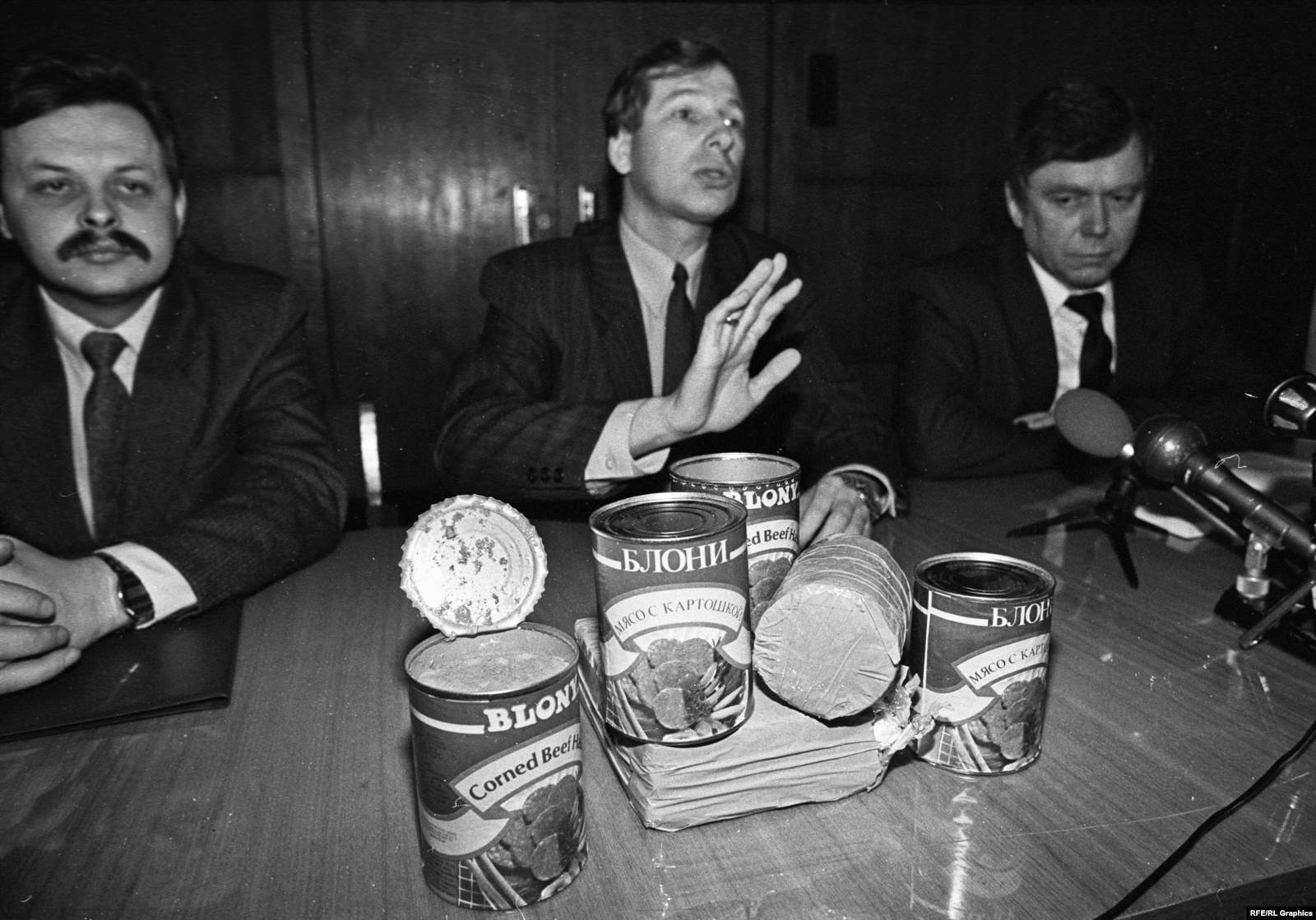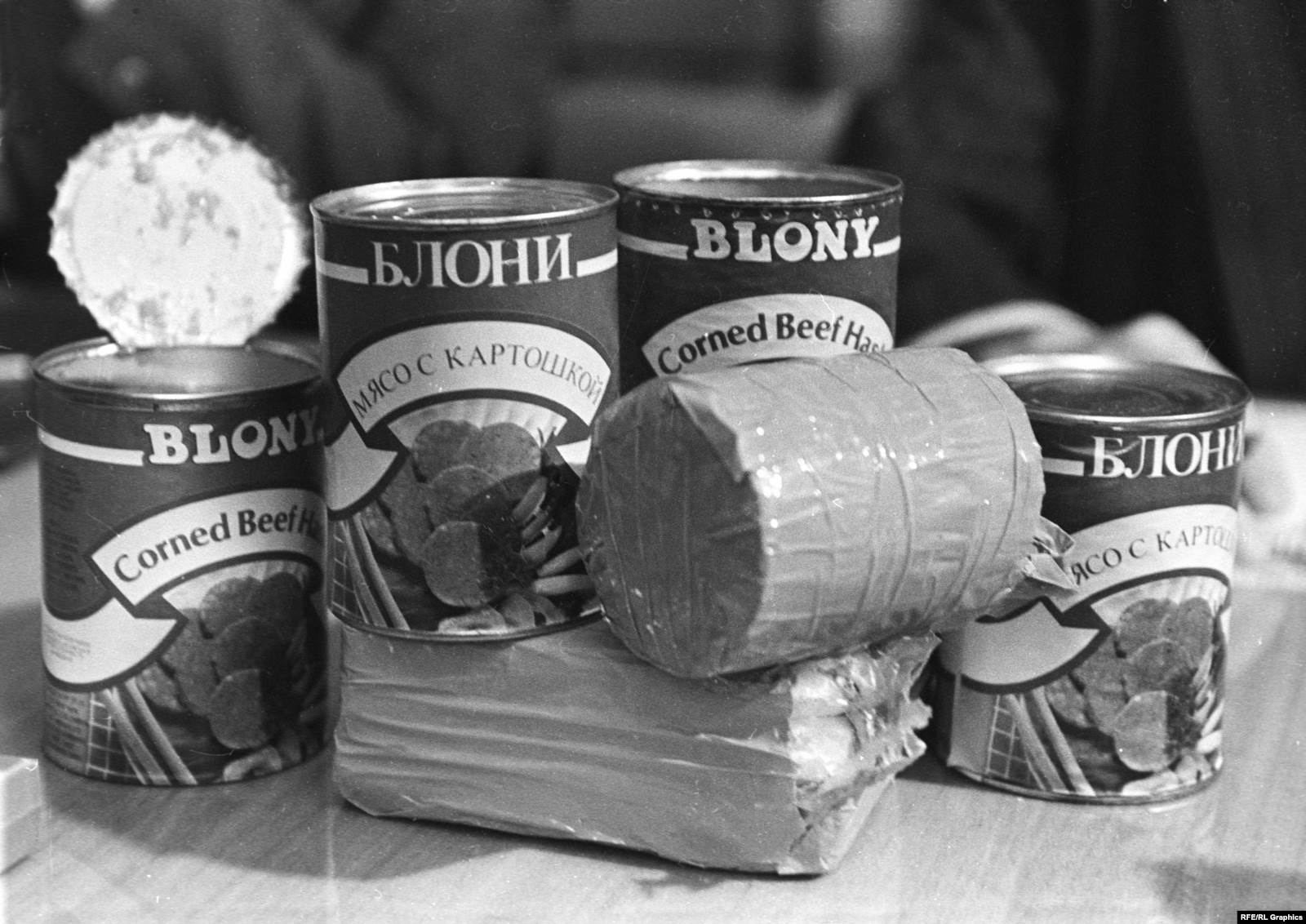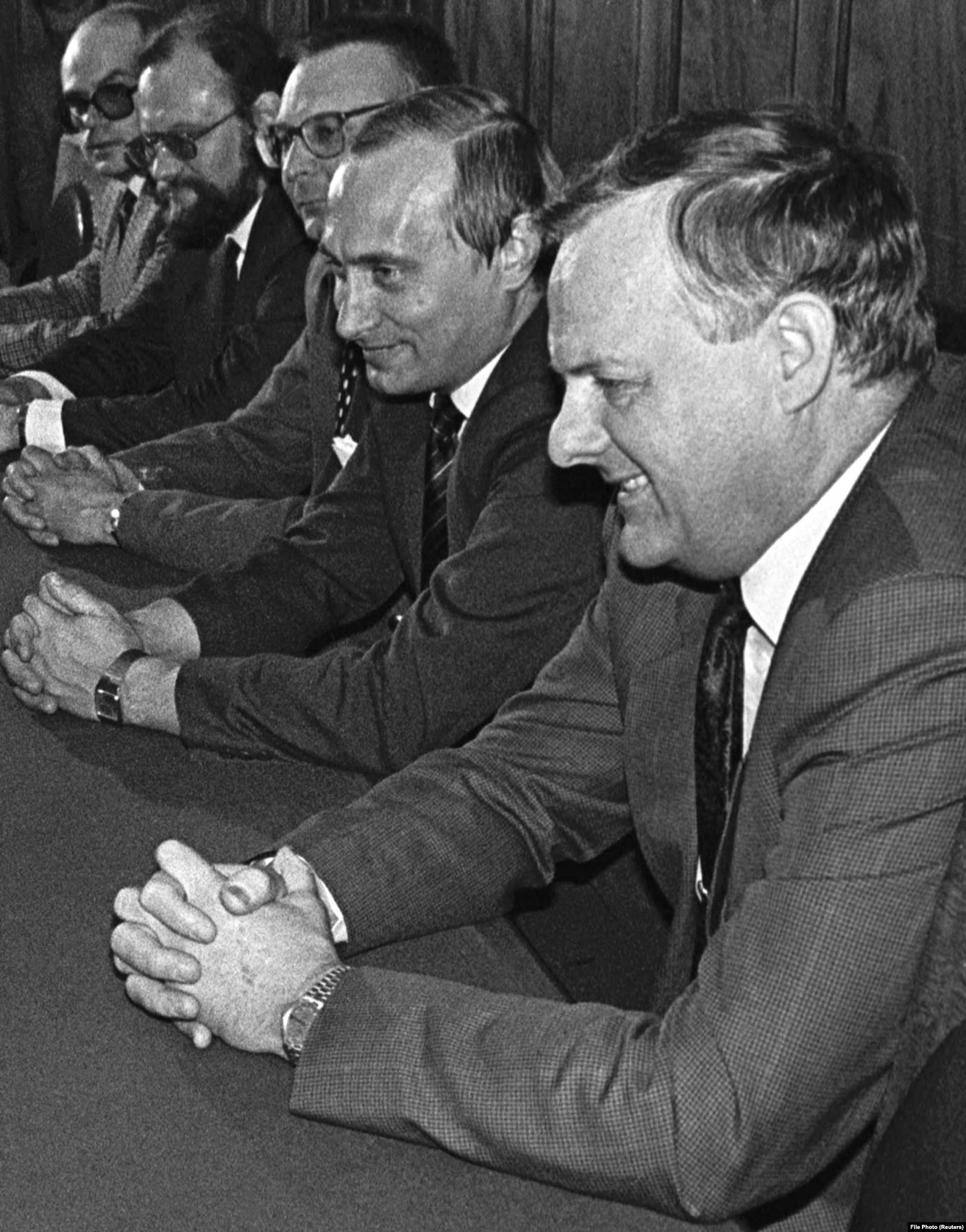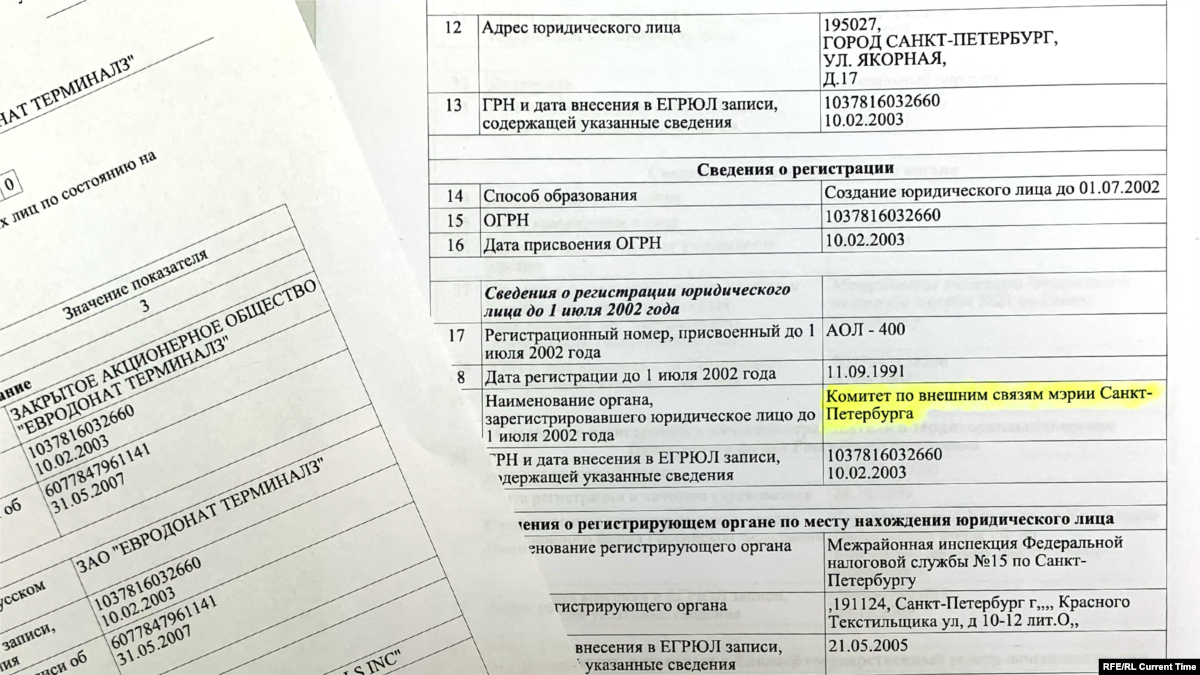The man in bulky winter fatigues licked his pinky, dabbed it inside the hand-sized package his underlings had just opened, and brought it, covered in white powder, to his mouth.
“Tastes bitter. Numbs the tongue,” he said as laughter filled the room.
It was February 1993 in St. Petersburg, and the man in the military uniform was sampling what was billed as the largest cocaine haul in Russian history: just over a metric ton -- with an estimated value of more than $100 million -- stashed in cans of corned beef that had been shipped from Colombia and smuggled into Russia by road via Finland.
The man whose security agents had seized the drugs was Viktor Cherkesov, known during Soviet times as a merciless KGB investigator. He was also a confidant of a fellow KGB alumnus serving as deputy mayor of St. Petersburg: an unremarkable spy-turned-bureaucrat named Vladimir Putin.
At a subsequent press conference, Cherkesov said the bust would result in a high-profile criminal trial of multiple suspects, and that the seized cocaine would be repurposed for medical use.
But no trial ever materialized in Russia. Cherkesov’s office halted the investigation seven months later, saying the main suspects had fled the country.
Nearly three decades later, it also remains unclear exactly what officials did with the 1,092 kilograms of Colombian cocaine, whose route had been tracked by authorities in multiple countries, including Germany and Israel, which ultimately convicted several of its citizens for narcotics trafficking in connection with the illicit shipment.

A newspaper run by Cherkesov’s wife later claimed it had been sent to a facility to produce medicine with it. But the author of the article acknowledged that he had been blindfolded at the facility and did not report actually seeing the cocaine.
The cocaine bust and the mystery of the missing drugs have since been the subject of journalistic investigations and much speculation.
A notorious St. Petersburg crime boss claimed a local police official whom Putin later appointed to a senior federal post had discussed taking custody of the seized drugs. And in 2015, a KGB defector alleged that Putin himself had been involved in drug smuggling.
Neither of these claims has ever been proven. But a new investigation by Current Time and RFE/RL’s Russian Service has uncovered evidence pointing to multiple links between individuals implicated in the 1993 cocaine smuggling case and the St. Petersburg mayor’s office, where Deputy Mayor Putin headed the External Relations Committee at the time.
This report is the first installment of an investigative project examining the scandals and scams that swirled around Vladimir Putin and his associates during his tenure as a St. Petersburg city official in the 1990s.
Two people directly linked to the Israeli investigation of the smuggling scheme -- an Israeli man who was convicted for his role and a witness -- were interviewed by RFE/RL’s Russian Service and Current Time, the Russian-language network led by RFE/RL in cooperation with VOA. Reporters also reviewed Israeli investigative records, Russian police documents, and video and newspaper archives. Their findings include:
- The Israeli convict says the paperwork he carried for the cocaine consignment listed a recipient as the St. Petersburg government’s public health watchdog -- and that an employee of the mayor’s office acted as an intermediary.
- A witness in the case told reporters that the arrested businessman had met with Putin’s boss, St. Petersburg Mayor Anatoly Sobchak.
- A senior investigator said that the cocaine smugglers were tied to a separate smuggling case in which Putin’s fellow deputy mayor was convicted.
Cherkesov remained close to Putin, who appointed him as Russia’s top counternarcotics officer in 2003 after he served three years as the Russian president’s envoy to the Northwest Federal District. Cherkesov has not held a government post since 2010.
Neither Cherkesov nor Russia’s Federal Security Service (FSB), where he was the top deputy during Putin’s stint as FSB director in 1998-99, responded to requests for comment for this report.

An ‘Official’ Order Of Meat (With Cocaine)
The man tasked with handling the paperwork for the cocaine shipment was Shemtov Michtavi, an Israeli career criminal who now apologizes for his misdeeds.
Michtavi was in the Netherlands in the fall of 1992 when an old friend looked him up. The friend’s Israeli associates had set up operations in Colombia in cooperation with the notorious Cali cartel, which U.S. authorities at the time described as “the most powerful cocaine-trafficking organization in the world.”
“I was supposed to get something like 4 or 5 million dollars,” Michtavi said in an exclusive interview late last year in Yehud, a town 15 kilometers east of Tel Aviv.
Michtavi’s criminal career began early. After his parents divorced in the 1960s, he bounced around and began stealing with other juvenile delinquents in Tel Aviv. His first arrest came at the age of 22 in 1974, and in total he has spent 32 of his 70 years behind bars.
Michtavi made several claims about the 1993 cocaine operation for which he remains the lone source. But reporters were able to at least partially corroborate several others with independent sources.
The ultimate destination for the cocaine consignment was the Netherlands, and it was Michtavi who was supposed to get the documentation for the shipment in order, according to the convicted felon and a transcript of his interrogation by Israeli police that reporters reviewed.
The idea to route the drugs through Russia, Michtavi says, came from his Israeli accomplice, Amos Sulami, who was well-connected in Russia. While Russia itself wasn’t a major cocaine market at the time, its lax security controls in the wake of the Soviet collapse were seen as an enticing transit point into Western Europe for South American cartels.
Authorities from multiple governments, including Israel and Germany, had been secretly monitoring the shipment of cocaine in what was known as Operation Acapulco, and Russian authorities had been tipped off that the consignment was coming their way.
But any hopes of tracking the shipment to its final destination in Western Europe -- and rooting out the organizers and accomplices across the entire route -- effectively ended when Russian security agents seized the container at the Torfyanovka crossing on the border with Finland on February 16, 1993.
At the press conference in St. Petersburg a week later, Cherkesov sat at a table on which cans of the Blony brand corned beef in which the cocaine had been smuggled sat.


Also on the table was a brick-shaped package -- one that would not fit inside a can. Michtavi said it was one of the cocaine bricks the Cali cartel added to the shipment as gifts for the smugglers.
“I know there [were] a couple packages,” Michtavi, who published a Hebrew-language book about his role in the affair last year and is now releasing it in English, said in the interview.
Amid the Soviet collapse and its aftermath, St. Petersburg faced severe food shortages, prompting city hall to seek various arrangements to fill the gap. These included scandalous barter deals made by the city’s External Relations Committee, which Putin headed, in which fly-by-night firms pocketed millions of dollars despite the fact that no food shipments were delivered in exchange.
Michtavi says that the documents he helped procure included one stating that the St. Petersburg administration under Putin’s boss, Mayor Anatoly Sobchak, had ordered the consignment of corned beef in which the cocaine was shipped.
A Cali cartel lawyer, whom Michtavi referred to as the “the doctor,” wanted a permit for the consignment from the city health authorities. Michtavi says he obtained the necessary paperwork linking the shipment to the St. Petersburg city health watchdog, which he referred to as the “sanitary department” -- an Anglicized version of the Russian name, “sanitarnaya sluzhba.”
“You can see the address [in the documents]: It was to the sanitary department of the mayor's [office] of St. Petersburg,” Michtavi said in the interview.
RFE/RL was unable to independently verify this claim. But an accomplice of Michtavi’s later convicted in Israel told police about a “doctor” and a document meant to demonstrate “that the request from Russia for the meat shipment was legitimate,” according to an interrogation transcript reviewed by reporters.
The accomplice, Yuval Shemesh, told investigators he could not say whether the “doctor” actually received the document, and a November 1993 report in The Jerusalem Post said the container was stopped because it lacked “a health certificate covering the food it was supposed to be carrying.”

Michtavi says the smugglers used two intermediaries in dealing with the St. Petersburg mayor’s office. The first was a staff member who he says was known to the smugglers by the alias “Roman Izikov.” Reporters could not find anyone by that name in Russian databases.
The second was a man whom, based on Michtavi’s description, RFE/RL was able to identify as Vladimir Bakhshiyev. RFE/RL independently obtained a headshot of Bakhshiyev and sent it to Michtavi alongside those of five other random individuals. Michtavi correctly identified Bakhshiyev’s photograph.
Michtavi said Bakhshiyev was a friend of Shabtai Kalmanovich, a colorful Russian emigre to Israel whom the FBI described as a “powerful associate” of Russian organized crime figures and said had “ties to former KGB agents and high-level Russian, Israeli, and other government officials throughout the world.”
It was Bakhshiyev, Michtavi claimed, who helped obtain the paperwork for the cocaine shipment from Sobchak’s administration.
Reporters could not independently confirm the link between Bakhshiyev and Kalmanovich, who was shot dead in a gangland-style assassination in Moscow in 2009. But Kalmanovich was close to Sobchak.

It was Kalmanovich who discovered Sobchak’s body in a hotel in Russia’s western exclave of Kaliningrad in February 2000, Sobchak’s widow, Lyudmila Narusova, said in a 2012 interview with the Russian newspaper Novaya gazeta. In the interview, Narusova hinted she had evidence of foul play in her husband’s death, which was officially attributed to a heart attack.
RFE/RL was unable to establish whether Bakhshiyev is still alive. Attempts to reach him and a relative at phone numbers associated with them were unsuccessful.
It has never been proven that Putin or his political mentor, Sobchak, knew what was really in the consignment of corned beef from Colombia. But Michtavi says he believes Sobchak was aware.
“I [don’t] have evidence about that. But Anatoly Sobchak, he was [in the] know. He should get some money for that,” he said in the interview late last year. “To tell you 100 percent, I cannot for sure. But you can see the address: It was to the sanitary department of the mayor's [office] of St. Petersburg.”
Narusova did not respond to a request for comment about the smuggled cocaine or Michtavi’s allegation.

The Logistics Magnate And The Mayor’s Office
At the time of the cocaine bust, one building away from a branch of St. Petersburg’s health watchdog that Michtavi said featured in the consignment records, a logistics company founded by a prominent Israeli businessman in the city was operating.
The company was called Eurodonat, and its owner, Oscar Donat, had built an impressive portfolio in the city. He had set up a shopping center featuring St. Petersburg’s first Philips electronics store, its first paging company, and a customs-clearance center called Eurodonat Terminals.
Eurodonat Terminals was one of numerous companies officially registered by St. Petersburg’s foreign-economic-relations committee, which Sobchak appointed Putin to lead in June 1991.
Its customs center was also where the shipping container with the cocaine stashed in corned-beef cans was heading when it was seized by Cherkesov’s men and Russian border guards on February 16, 1993, according to a newspaper report at the time.

Donat’s connections with power players were undeniable. He had spoken publicly of his interactions with Sobchak about his business operations in Russia’s second city. And just months before the Soviet Union disintegrated, Eurodonat Terminals had even founded a security firm, called Panther, together with the St. Petersburg police department and a special department of the KGB, according to records from the St. Petersburg Registration Chamber's database reviewed by RFE/RL.
One of Cherkesov’s subordinates at the KGB successor agency initially called the Security Ministry, Sergei Yakovlev, told The Jerusalem Post in November 1993 that Donat had continued traveling to Russia after the cocaine was seized and that the ministry had questioned him. Donat admitted knowing two suspects who were subsequently arrested -- one of whom was convicted in Israel -- but “denied all connection with the drugs,” Yakovlev said.
Donat was arrested in Israel in September 1993 on suspicion of arranging cocaine deals in Russia and ordered into custody by a Tel Aviv court.

Donat’s name also appears in the request for legal assistance that Israel sent to Finnish authorities in September 1993, identifying the businessman as a “suspect.”

RFE/RL tracked down a witness cited in the Israeli criminal-case materials. The witness, Vasily Didenko, had been hired as a driver by one of the accomplices whom Israel eventually convicted.
“Company directors visited Donat at a hotel every day. They brought him cases stuffed with cash. Even Sobchak visited him,” Didenko said in a telephone interview. “Everyone was for sale in those days. Donat didn't have just one car, he had several. He traveled with bodyguards. The cops protected him.”
While an Israeli court eventually convicted Michtavi and four others in connection with the smuggled cocaine, the charges against Donat were eventually dropped due to lack of evidence.

The charges against the lone suspect arrested by Russian authorities, Dmitry Selyuk, were also dropped. Selyuk, who has since become a well-known soccer agent, was one of the suspects whom Donat admitted to knowing, Russian investigators said.

A Soviet-born Israeli citizen, Selyuk was accused of trying to bribe a local doctor to issue a health certificate to secure the release of the meat shipment in which the cocaine was stashed, though he insisted he was innocent.
Michtavi told reporters for this report that he had passed documents featuring addresses -- including that of St. Petersburg city hall -- related to the corned-beef shipment to his intermediary with Sobchak’s office, Vladimir Bakhshiyev, when the two met in the Netherlands.
The same documents ended up in the hands of the man -- Selyuk -- accused of trying to bribe officials to release the shipment, Michtavi claimed, though he conceded that he didn’t remember the man’s name off the top of his head.
“I was never involved with him and don’t know him, I just read it in the newspapers,” Michtavi, who said he learned details of the container’s seizure from friends while in hiding in the Netherlands for several months before his arrest, said in the interview.
Reached by telephone, Selyuk declined to discuss the 1993 cocaine bust and the accusations against him.
“I don’t even want to comment on this nonsense,” he said.
FBI Suspicions
The St. Petersburg newspaper Vecherny Peterburg claimed at the time that Selyuk had been involved with a Russian company called Komkad, though RFE/RL could not independently confirm this.
Komkad gained notoriety in the 1990s for failing to deliver a $2.8 million shipment of sugar ordered by the St. Petersburg mayor’s office.
Citing FBI documents, the Los Angeles Times reported in March 2000 that Komkad’s co-owner, Russian businessman Oleg Popov, was suspected of involvement in the smuggling of the metric ton of cocaine seized by Russian authorities in 1993.
Popov was shot dead in St. Petersburg in 1994.

Putin’s Colleague And The Smuggled Isotope
Donat was connected to St. Petersburg Deputy Mayor Lev Savenkov, a direct associate of Putin and Sobchak at city hall who was involved in a separate smuggling case that Cherkesov’s subordinate linked to the 1993 cocaine operation.
Prior to joining Sobchak and Putin in city hall in 1992, Savenkov had served as general director of the Donat-owned shopping center Alisa.
In October 1993, around the time Israel was arresting suspects in the cocaine-smuggling investigation, Savenkov was arrested in a separate -- and bizarre -- smuggling case.
In September of that year, an associate of Savenkov had been detained at the same crossing point on the Finnish border where Russian authorities had seized the cocaine seven months earlier. In the glove compartment of the car he was driving, border guards found several grams of what he described as the isotope osmium-187.
The substance, it emerged later, came from Vladimir Petrik, a controversial but well-connected scientist who has been denounced by many in Russia’s scientific community as a charlatan.
Savenkov was charged with smuggling, though it was unclear exactly what revolutionary applications the substance might have. Publicly, Savenkov said the incident was part of a plan to promote the substance to potential foreign buyers to raise money for St. Petersburg’s budget under the umbrella of a secretive “corporation” to be set up with city hall.
Putin corroborated Savenkov’s account of this “corporation” in a March 1994 interview with a local newspaper, and said that the scientist -- whom Putin did not name but who, in fact, was Petrik -- was prepared to work for this mysterious entity.
In June 1997, a St. Petersburg court sentenced Savenkov to five years in prison after convicting him in the osmium-smuggling case and an additional case of caviar smuggling.
The following year, Sergei Yakovlev -- one of the original top investigators working under Cherkesov on the 1993 cocaine-smuggling case -- publicly connected Savenkov’s case with that of the massive drug bust.
“We came to the conclusion that the same individuals who helped Savenkov smuggle caviar and osmium participated in the illegal transport of 1 ton of cocaine onto Russian territory,” Yakovlev told a Russian true-crime program in 1998.
Reporters could find no record, however, of any subsequent criminal cases or convictions linked to this alleged criminal nexus.
Reached by telephone, Savenkov said he knew Donat but denied any connection to the cocaine-smuggling operation.

An Operation Cut Short
After Russian authorities seized the metric ton of cocaine stashed in the corned-beef cans, observers questioned whether the operation by authorities of multiple countries could have yielded greater results if it hadn’t ended in Russia.
“Was it worth it to blow our own horn to such great fanfare...or would it have been nice to track the entire chain of passage of such a large shipment of cocaine?” one Russian columnist wrote shortly after the seizure.
The prominent Belgian investigative journalist Alain Lallemand, who chronicled the case closely, wrote in 1995 that Russia seized the cocaine “against all logic.”
If other governments were miffed about Russia’s move, they didn’t grumble publicly. At a joint press conference in Moscow with senior U.S. and German officials, a senior Russian Interior Ministry official thanked his German colleague, saying it was his team that first tipped Russia off about the cocaine shipment, and the German official proceeded to tout the importance of multilateral cooperation on such efforts.
But Vasily Didenko, the Russian witness in the Israeli criminal case contacted by reporters, said the Israeli investigators who questioned him told him they had planned to track the consignment to its final destination.
“But instead of tracking it all the way, they just arrested six guys or so,” Didenko said in a telephone interview.
An individual listed as a “Russian security officer” also testified in the Israeli criminal trial, according to case materials RFE/RL reviewed. But the records gave only his initials, and RFE/RL was unable to establish this person’s identity.
In a 1996 documentary titled A Man’s Job that lauds the work of the FSB -- and credits Putin with the idea for the film -- senior FSB investigator Sergei Yakovlev praises the work Russia did on the cocaine case, saying it had handed over “a large quantity of case materials to Israel.”
“It was all reflected in the sentences handed down in Israel,” Yakovlev said.

Gangsters, Police, And A ‘Delicate Operation’
So what exactly happened to the metric ton of Cali-cartel cocaine stashed in corned-beef cans after Russia seized it?
While Cherkesov, with whom Putin has said publicly he was close, said after the bust that it would be repurposed for medical use, his subordinate, Yakovlev, sounded noncommittal in an interview nine months later.
"We don't know what we'll do with all the cocaine," Yakovlev was quoted by The Jerusalem Post as saying. "Maybe we'll give it to a hospital."

According to one Russian crime kingpin, officials and gangsters were concocting plans to enrich themselves from the proceeds of the cocaine.
In a 2016 interview from prison, where he is serving a 25-year sentence for his role as head of the notorious Tambov crime group, Vladimir Kumarin said he was approached by a St. Petersburg police official named Nikolai Aulov in 1992 or 1993 to discuss the cocaine shipment seized at the Finnish border.
“As I understood it, he was hinting that I should take the drugs under control, arguing that whoever takes them under control will get big money. Those who get big money will become strong and kill or imprison us, which is how it turned out. Everything came true,” Kumarin, who was known as St. Petersburg’s “night governor” in the 1990s due to his enormous influence in organized crime and politics, said in the interview.
At the time, Aulov was an organized-crime specialist with St. Petersburg police. In 2006, Putin -- then in his second term as president -- appointed him head of the Interior Ministry’s directorate in the Northwest Federal District, the top police official for a large region that includes St. Petersburg.
In 2016, Spanish authorities issued an international arrest warrant for Aulov, by then deputy head of Russia’s federal counternarcotics agency, over his demonstrated links with Russian gang leader Gennady Petrov. Aulov’s agency denied the allegations.
While Russian authorities publicly touted the seizure of such a large consignment of cocaine and informed the media about developments in the investigation, reporters were unable to find any record of press conferences or press releases about what happened to the drugs.
The FSB did not respond to an e-mail seeking comment on whether the metric ton of cocaine seized in 1993 had been repurposed for medical use as its senior officials, Cherkesov and Yakovlev, suggested it would be.
Reporters sent questions about the cocaine to Cherkesov through his wife, Natalia Cherkesova, a prominent Russian journalist for three decades and editor-in-chief of the St. Petersburg-based news outlet Rosbalt.
She did not confirm whether she passed on the questions to Cherkesov. But she did send a scan of a 1995 article published by the St. Petersburg newspaper she was editing at the time, Chas pik, or Rush Hour.
The article is a firsthand account by the paper’s reporter about accompanying two trucks purportedly carrying the seized cocaine to a facility in Moscow that would supposedly convert it into medicine.
According to the article, the delivery was carried out amid heightened secrecy and security by the St. Petersburg branch of the FSB, which Cherkesov headed at the time. The author, who did not report actually seeing the cocaine, wrote that the FSB operatives blindfolded him “like in a movie” upon arrival and did not remove the mask until he was in the office of a top official at the facility.
The article cited an unidentified deputy director there as expressing concern that organized crime might attack the facility to steal the cocaine -- and surprise that the World Health Organization (WHO) had agreed to allow such a large haul of illicit cocaine to be processed for medical purposes.
RFE/RL contacted the WHO and asked if the Geneva-based organization had any record of such an agreement. A spokesman said the WHO checked in its archive but “could not find anything relevant in our records.”
The article in the newspaper run by Cherkesov’s wife concluded by thanking the FSB branch that he headed for “giving our journalist the unique opportunity to participate in such a delicate operation.”
